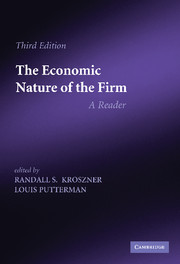Book contents
- Frontmatter
- Contents
- Editors' preface
- Reintroducing The Economic Nature of the Firm
- Part I Within and among firms: the division of labor
- 1 From The Wealth of Nations
- 2 From Capital
- 3 From Risk, Uncertainty, and Profit
- 4 From The Modern Corporation and Private Property
- 5 The use of knowledge in society
- 6 Corporate governance
- Part II The scope of the firm
- Part III The employment relation, the human factor, and internal organization
- Part IV Finance and the control of the firm
- References
- References
5 - The use of knowledge in society
Published online by Cambridge University Press: 05 June 2014
- Frontmatter
- Contents
- Editors' preface
- Reintroducing The Economic Nature of the Firm
- Part I Within and among firms: the division of labor
- 1 From The Wealth of Nations
- 2 From Capital
- 3 From Risk, Uncertainty, and Profit
- 4 From The Modern Corporation and Private Property
- 5 The use of knowledge in society
- 6 Corporate governance
- Part II The scope of the firm
- Part III The employment relation, the human factor, and internal organization
- Part IV Finance and the control of the firm
- References
- References
Summary
What is the problem we wish to solve when we try to construct a rational economic order?
On certain familiar assumptions the answer is simple enough. If we possess all the relevant information, if we can start out from a given system of preferences, and if we command complete knowledge of available means, the problem which remains is purely one of logic. That is, the answer to the question of what is the best use of the available means is implicit in our assumptions. The conditions which the solution of this optimum problem must satisfy have been fully worked out and can be stated best in mathematical form: put at their briefest, they are that the marginal rates of substitution between any two commodities or factors must be the same in all their different uses.
This, however, is emphatically not the economic problem which society faces. And the economic calculus which we have developed to solve this logical problem, though an important step toward the solution of the economic problem of society, does not yet provide an answer to it. The reason for this is that the “data” from which the economic calculus starts are never for the whole society “given” to a single mind which could work out the implications, and can never be so given.
The peculiar character of the problem of a rational economic order is determined precisely by the fact that the knowledge of the circumstances of which we must make use never exists in concentrated or integrated form but solely as the dispersed bits of incomplete and frequently contradictory knowledge which all the separate individuals possess.
- Type
- Chapter
- Information
- The Economic Nature of the FirmA Reader, pp. 63 - 68Publisher: Cambridge University PressPrint publication year: 2009
References
- 581
- Cited by



